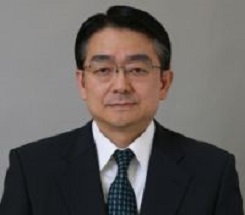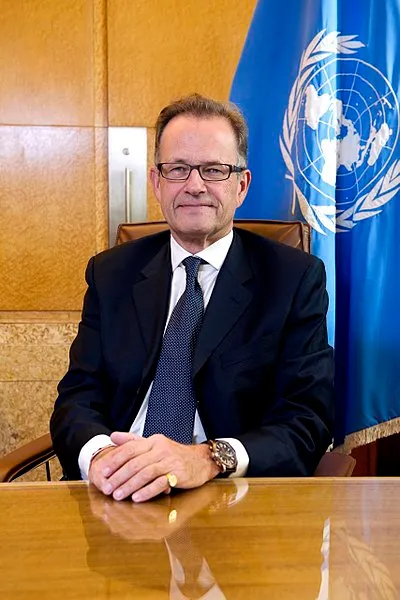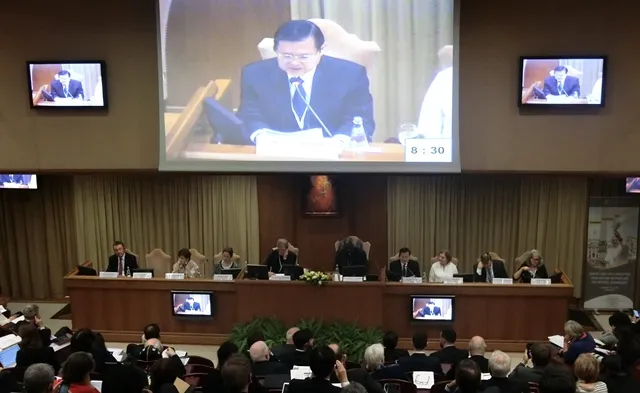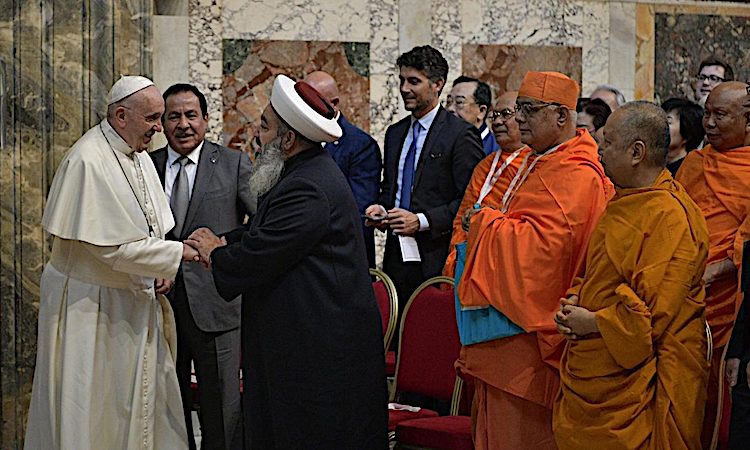By Ramesh Jaura
BERLIN | VATICAN CITY (IDN) – Much water has flown under the Tiber bridges since the Holy See declined an invitation in 1923 to join the League of Nations stating that its only competency was in matters of elucidation of questions of principle in morality and public international law. JAPANESE
Forty-one years later, the Holy See became a permanent observer state at the United Nations on April 6, 1964. Since then four Popes have addressed the UN General Assembly: Paul VI in 1965, John Paul II in 1979 and 1995, Pope Emeritus Benedict XVI in 2008, and Pope Francis in 2015.
All of them expressed their great esteem for the Organization, which they considered the appropriate juridical and political response to the present moment of history, marked by humankind’s technical ability to overcome distances and frontiers and, apparently, to overcome all natural limits to the exercise of power.
Pope Francis also highlighted the importance of the 2030 Agenda for Sustainable Development adopted by all United Nations Member States on the 70th anniversary of the UN on September 25, 2015.
The Agenda provides a shared blueprint for peace and prosperity for people and the planet, now and into the future. At its heart are the 17 Sustainable Development Goals (SDGs), which are an urgent call for action by all countries – developed and developing – in a global partnership.
Three and a half years after the adoption of the 2030 Agenda, the Vatican’s Dicastery and the Pontifical Council for Interreligious Dialogue hosted from March 7-9, 2019 a three-day International Conference on Religions and Sustainable Development Goals (SDGs): Listening to the cry of the earth and the poor’.
Participants were the representatives of different religions, diplomats, and leaders of international organisations, engaged with implementing sustainable development goals, as well as scholars and researches in the general area of international development.

Among representatives of faith-based and other civil society organisations was Hirotsugu Terasaki, the Director General of Peace and Global Issues of the lay Buddhist organization Soka Gakkai International (SGI), in Tokyo, Japan. He found the conference “indeed significant”.
“The underlying spirit of the SDGs is the commitment to leave no one behind. So, the first thing I would stress is the importance of dialogue based on mutual acknowledgement of the dignity and worth of each individual,” he told IDN.
Besides, he explained, “a shared recognition of the essential nature of the challenges we face is the starting point for concrete action. As members of civil society people of faith have a crucial role to play in the search for solutions.”
Muhammed Abu Zaid, Chairman of the Sunni Court of Saida in Lebanon, told IDN that the conference had brought people of different faiths together, “not only to talk to each other but also to work out an action plan” in order to preserve the planet Earth, which is after all an important aim of the SDGs.
“Partnership between faith communities for a common goal of preserving this planet, he said, “is the crux of the conference and the best thing that can be done.”
Asked whether the conference would help remove acrimonies between religions, Zaid said: “Yes, it should help remove the acrimonies. But by itself it’s not enough. We have to walk the talk. We need to walk the journey together and have an action plan to change our teachings and our theories to something that is more practical.”
Vandana Shiva, an Indian scholar, environmental activist, food sovereignty advocate, and alter-globalization author, who addressed the inter-religious conference on the ‘Hindu perspective’, said that there is no difference in the deep spiritual perspective of Hinduism and Christianity. “Both talk about the integrity of creation, though they use different words,” she told IDN.
“We say in the Upanishads: ‘Avoid greed’. Christ went and turned the tables of the money lenders. So, the basic principles are common,” she said. “I think the Vedas and Upanishads are the oldest spiritual texts of the world, and they show how to live as human beings on a planet to sustain its life. So, the main difference will be that Abraham traditions are 2,000 years old, ours are ten thousand years old. Grandmothers are always wiser.”
The best known Abrahamic religions are Judaism, Christianity and Islam – all monotheistic. They also all believe that people should pray to and worship God often. Of monotheistic religions, the Abrahamic religions have the world’s largest number of followers.
The Upanishads, a part of the Vedas, are ancient Sanskrit texts that contain some of the central philosophical concepts and ideas of Hinduism, some of which are shared with religious traditions like Buddhism and Jainism.

Michael Møller, UN Under-Secretary-General and Director-General of the UN Office at Geneva said this was “one of the best conferences on SDG implementation and partnerships” that he had “attended in a while”, and he was going home “with a renewed sense of optimism and purpose”.
Earlier, speaking to participants in a plenary session, Møller said, as he was travelling to Rome from Geneva, he was reflecting on the relationship between the United Nations and religion.
“The United Nations – while being a secular organization – has been aligned with the great faiths of the world since its very inception,” he said.
“As a beacon of hope for humanity, the UN – like the great faiths – is there to bring people together in the universal aspiration for a better world; a tolerant, peaceful world; a world in which everyone can hope to advance from the circumstances of their birth, irrespective of whether they are born poor or rich, or indeed whether they are born a man or a woman.
“The UN was created not only for the powerful, but for the marginalized, the downtrodden, the vulnerable. It was created to leave no one behind, an aspiration and clear objective at the very heart of the Sustainable Development Goals,” added the UN Geneva chief.
He quoted “great Secretary-General Dag Hammarskjöld” who once said: “The United Nations stands outside – necessarily outside – all confessions. But it is, nevertheless, an instrument of faith. As such, it is inspired by what unites, and not by what divides, the great religions of the world.”
Møller continued: “And it is still true: at the heart of our actions we are dealing in universal values: to be merciful, to be tolerant, to love thy neighbor.
“No tradition can claim monopoly on such teachings; they are ingrained in the human spirit, and enshrined in international human rights law. They animate the UN Charter and they encapsulate the essence of the 2030 Agenda.”
“The idea is to work together on [a] joint ‘journey’ in order to raise ambition and forge a new global solidarity,” Cardinal Peter K. Turkson, a Ghanaian cardinal of the Roman Catholic Church, who heads the Dicastery for Promoting Integral Human Development, said in an interview with IDN.
Religions bring and inspire purpose for change, he said. “If we want to forge sustainable development, we may need to change urgently and radically patterns of lifestyles, ways of producing goods, trading, consuming and wasting. Such a change requires deep motivation, a motivation that the technical language of development often cannot provide.
“Among powerful stories that trigger life-change, religious narratives stand out. These narratives, transmitted from one generation to another, have captured the imagination of millions of people and countless communities worldwide. They can actually provide the incentive for the transformation we need today.”
In opening remarks to the conference on March 7, Cardinal Turkson said that there are three groups of people who can provide the extra energy required for sustainable future.

‘Perspectives for a World Free from Nuclear Weapons and for Integral Disarmament’ was the theme of Vatican’s Dicastery for Promoting Integral Human Development from November 10-11, 2017 in which religious leaders and representatives of civil society, officials of State and international organizations, eminent academics, Nobel Laureates, and students, participated. [INPS Japan/IDN – 31 March 2019]
Photo: Pope Francis addresses participants of an international conference entitled, ‘Religions and the Sustainable Development Goals’. Credit: Vatican Media.
Related article > World Religions Prepare for Global Development Summit


